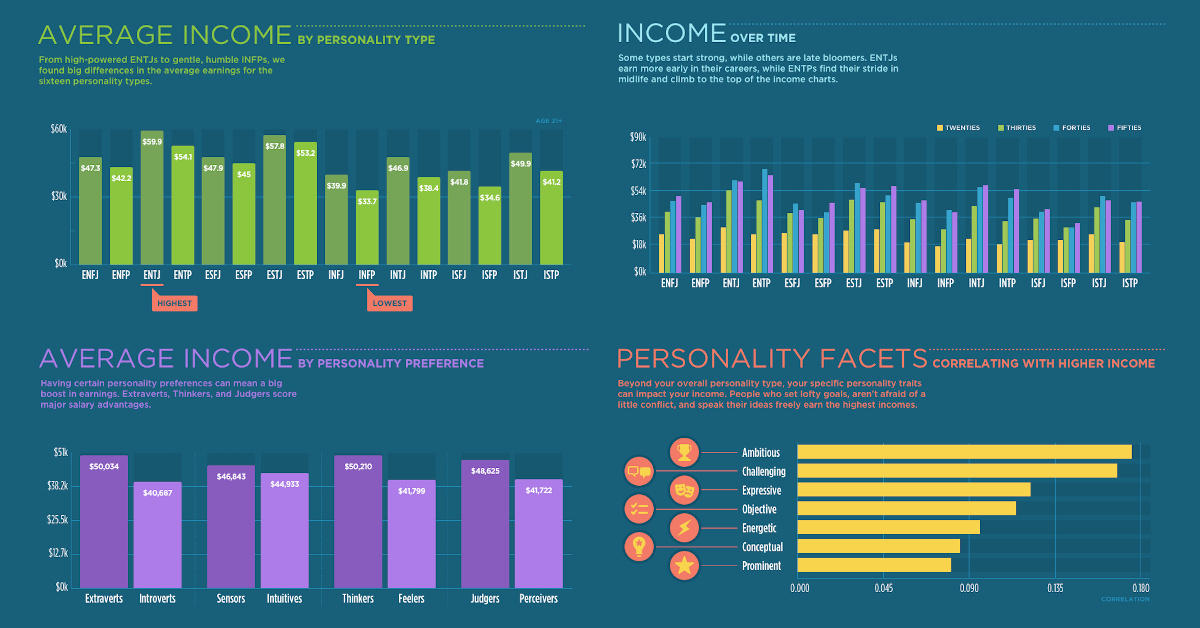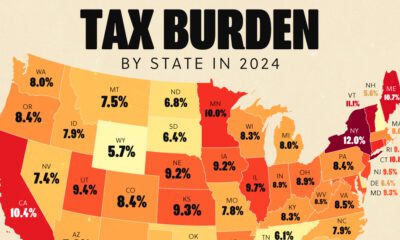Personal Finance
How Does Your Personality Type Affect Your Income?

How Does Your Personality Type Affect Your Income?
You’ve just finished giving a presentation at work, and an outspoken coworker challenges your ideas. Do you:
a) Engage in a friendly debate about the merits of each argument, or
b) Avoid a conflict by agreeing or changing the subject?
The way you approach this type of situation may influence how much money you earn.
Today’s infographic comes to us from Truity, and it outlines the potential relationship between personality type and income.
Through the Myers-Briggs Lens
The Myers-Briggs personality test serves as a robust framework for analyzing the connection between personality and income, in a way that is easily understood and familiar to many people.
The theory outlines four personality dimensions that are described using opposing traits.
- Extraversion vs. Introversion: Extroverts gain energy by interacting with others, while introverts draw energy from spending time alone.
- Sensing vs. Intuition: Sensors prefer concrete and factual information, while intuitive types use their imagination or wider patterns to interpret information.
- Thinking vs. Feeling: Thinkers make rational decisions based on logic, while feelers make empathetic decisions considering the needs of others.
- Judging vs. Perceiving: Judging types organize their life in a structured manner, while perceiving types are more flexible and spontaneous.
For example, someone who aligns with extraversion, sensing, thinking, and judging would be described as an ESTJ type.
The researchers surveyed over 72,000 people to measure these four personality preferences, as well as 23 unique facets of personality, income levels, and career-related data.
Traits With the Highest Earning Potential
Based on the above four dimensions, extroverts, sensors, thinkers, and judgers tend to be the most financially successful. Diving into specific personality characteristics, certain traits are more closely correlated with higher income.
| Personality Type | Average Income Advantage (Annual) | Trait(s) Most Correlated With Income Advantage |
|---|---|---|
| Extroverts | $9,347 | Expressive, Energetic, Prominent |
| Sensors | $1,910 | Conceptual |
| Thinkers | $8,411 | Challenging, Objective, Rational |
| Judgers | $6,903 | Ambitious |
For instance, extroverts are much more likely to have higher incomes if they are quick to share thoughts, have high energy, and like being in the public eye. Thinkers also score high on income potential, especially if they enjoy debates, make rational decisions, and moderate their emotions.
The Top Earners
Which personality types earn the highest incomes of all? Extroverted thinking types dominate the ranks again.
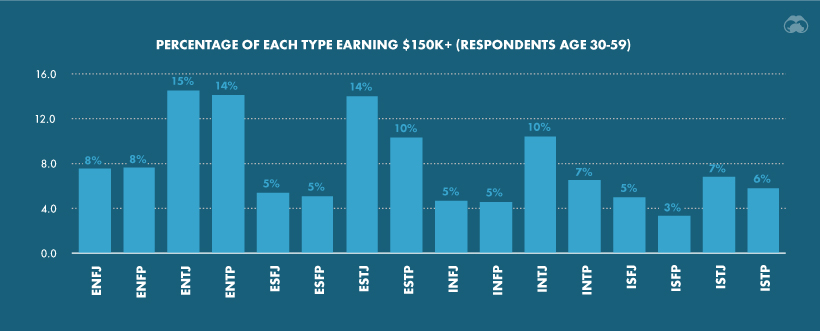
Source: Truity
The one exception is INTJs, with 10% earning an annual salary of $150K or more in their peak earning years.
Personality and the Gender Pay Gap
With all these factors in mind, the researchers analyzed whether personality differences would affect the gender pay gap.
When the average salaries were separated for men and women, the results were clear: men of almost all personality types earn more than the average income for the sample overall, while all but two personality types of women earned less than the average.
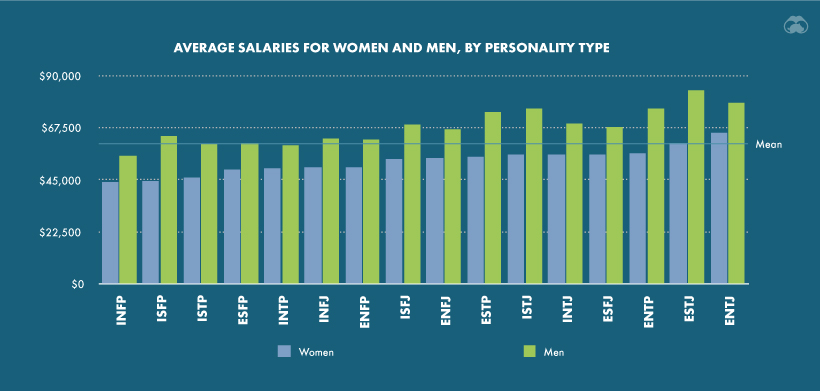
Source: Truity
In fact, women with high-earning personality types still earn less than men who do not possess those traits. For example, extroverted women earn about $55,000 annually, while introverted men earn an average of over $64,000.
Maximizing Your Potential
Are the introverted personalities of the world doomed to lower salaries? Not necessarily—while personality does play a role, many other factors contribute to income levels:
- Level of education
- Years of experience
- Local job market
- Type of industry
- The particular career
Not only that, anyone can work on the two specific personality traits most aligned with higher incomes: set ambitious goals, and face conflict head-on to ensure your voice is heard.
Wealth
Visualizing the Tax Burden of Every U.S. State
Tax burden measures the percent of an individual’s income that is paid towards taxes. See where it’s the highest by state in this graphic.
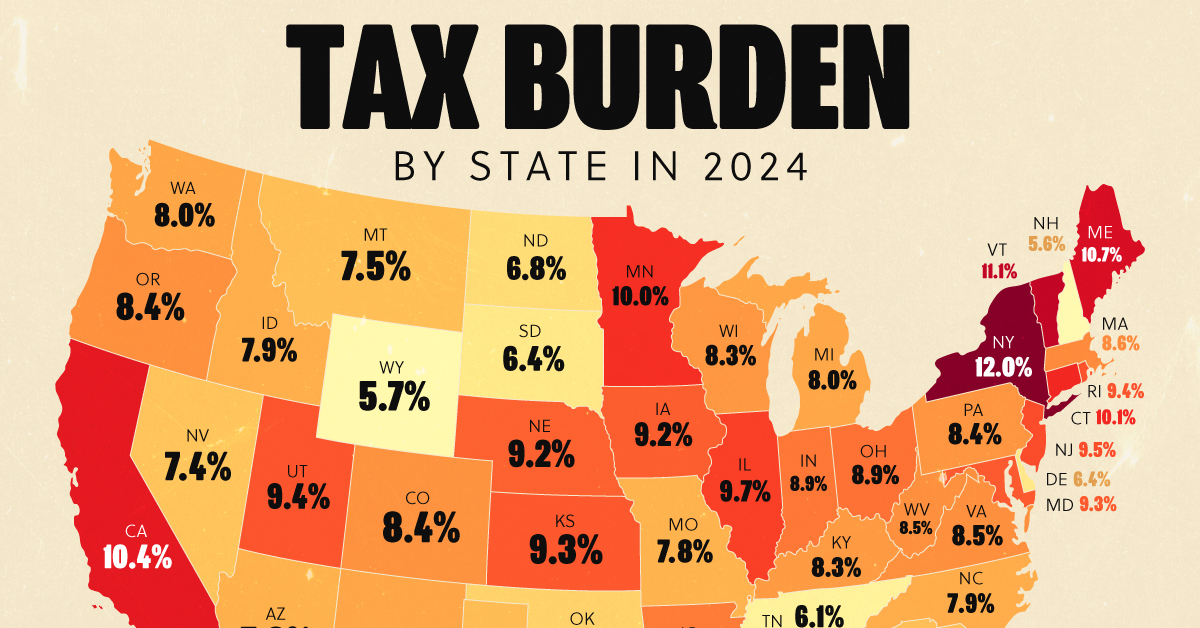
Visualizing the Tax Burden of Every U.S. State
This was originally posted on our Voronoi app. Download the app for free on iOS or Android and discover incredible data-driven charts from a variety of trusted sources.
This map graphic visualizes the total tax burden in each U.S. state as of March 2024, based on figures compiled by WalletHub.
It’s important to understand that under this methodology, the tax burden measures the percent of an average person’s income that is paid towards state and local taxes. It considers property taxes, income taxes, and sales & excise tax.
Data and Methodology
The figures we used to create this graphic are listed in the table below.
| State | Total Tax Burden |
|---|---|
| New York | 12.0% |
| Hawaii | 11.8% |
| Vermont | 11.1% |
| Maine | 10.7% |
| California | 10.4% |
| Connecticut | 10.1% |
| Minnesota | 10.0% |
| Illinois | 9.7% |
| New Jersey | 9.5% |
| Rhode Island | 9.4% |
| Utah | 9.4% |
| Kansas | 9.3% |
| Maryland | 9.3% |
| Iowa | 9.2% |
| Nebraska | 9.2% |
| Ohio | 8.9% |
| Indiana | 8.9% |
| Arkansas | 8.8% |
| Mississippi | 8.8% |
| Massachusetts | 8.6% |
| Virginia | 8.5% |
| West Virginia | 8.5% |
| Oregon | 8.4% |
| Colorado | 8.4% |
| Pennsylvania | 8.4% |
| Wisconsin | 8.3% |
| Louisiana | 8.3% |
| Kentucky | 8.3% |
| Washington | 8.0% |
| New Mexico | 8.0% |
| Michigan | 8.0% |
| North Carolina | 7.9% |
| Idaho | 7.9% |
| Arizona | 7.8% |
| Missouri | 7.8% |
| Georgia | 7.7% |
| Texas | 7.6% |
| Alabama | 7.5% |
| Montana | 7.5% |
| South Carolina | 7.5% |
| Nevada | 7.4% |
| Oklahoma | 7.0% |
| North Dakota | 6.8% |
| South Dakota | 6.4% |
| Delaware | 6.4% |
| Tennessee | 6.1% |
| Florida | 6.1% |
| Wyoming | 5.7% |
| New Hampshire | 5.6% |
| Alaska | 4.9% |
From this data we can see that New York has the highest total tax burden. Residents in this state will pay, on average, 12% of their income to state and local governments.
Breaking this down into its three components, the average New Yorker pays 4.6% of their income on income taxes, 4.4% on property taxes, and 3% in sales & excise taxes.
At the other end of the spectrum, Alaska has the lowest tax burden of any state, equaling 4.9% of income. This is partly due to the fact that Alaskans do not pay state income tax.
Hate Paying Taxes?
In addition to Alaska, there are several other U.S. states that don’t charge income taxes. These are: Florida, Nevada, South Dakota, Tennessee, Texas, Washington, and Wyoming.
It’s also worth noting that New Hampshire does not have a regular income tax, but does charge a flat 4% on interest and dividend income according to the Tax Foundation.
Learn More About Taxation From Visual Capitalist
If you enjoyed this post, be sure to check out this graphic which ranks the countries with the lowest corporate tax rates, from 1980 to today.
-
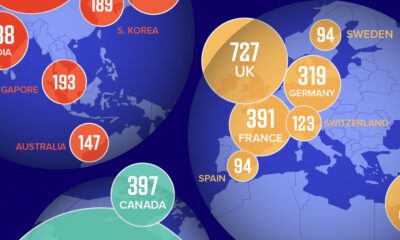
 Technology5 days ago
Technology5 days agoMapped: The Number of AI Startups By Country
-
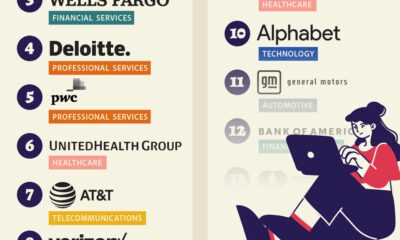
 Markets2 weeks ago
Markets2 weeks agoThe Best U.S. Companies to Work for According to LinkedIn
-

 Economy2 weeks ago
Economy2 weeks agoRanked: The Top 20 Countries in Debt to China
-
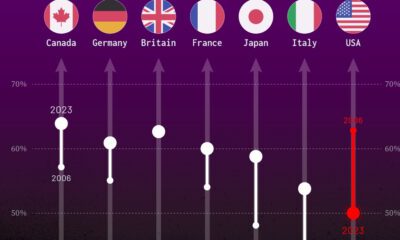
 Politics2 weeks ago
Politics2 weeks agoCharted: Trust in Government Institutions by G7 Countries
-
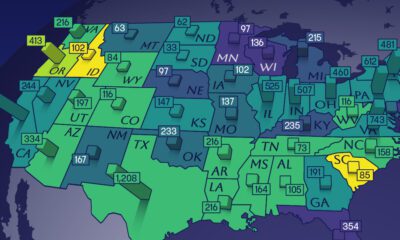
 Energy2 weeks ago
Energy2 weeks agoMapped: The Age of Energy Projects in Interconnection Queues, by State
-

 Mining2 weeks ago
Mining2 weeks agoVisualizing Global Gold Production in 2023
-
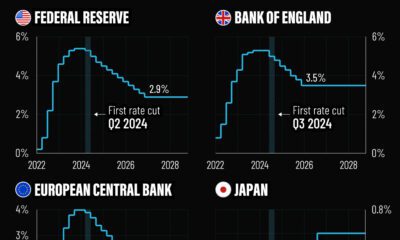
 Markets1 week ago
Markets1 week agoVisualized: Interest Rate Forecasts for Advanced Economies
-
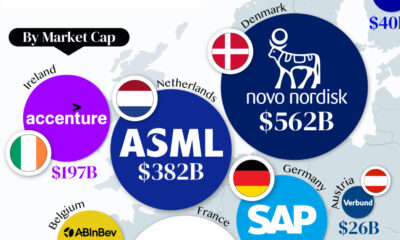
 Economy1 week ago
Economy1 week agoThe Most Valuable Companies in Major EU Economies

